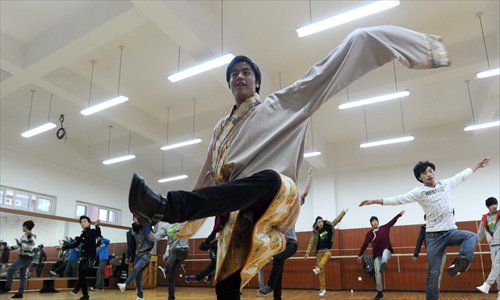Weight of privilege

Zhao Wen, 24, a second-year graduate student with Beijing's Minzu University of China (MUC), is of the Dai ethnic minority group.
Zhao, who is from the Xishuangbanna Dai Autonomous Prefecture in Southwest China's Yunnan Province, was admitted in 2005 after preferential policies for minority groups granted him an extra 30 points toward the results of his gaokao, also known as the national college entrance examinations.
He is often selected from among his nearly 16,000 schoolmates for many high-level political conferences and forums.
On May 4, Zhao participated in the celebration of the 90th anniversary of the Communist Youth League during which President Hu Jintao delivered a speech encouraging young people to strive to build the socialist China.
During the past summer vacation, he was sent to volunteer in an education institute in Surin, Thailand.
Affirmative action for minority groups can be a loaded topic in China. Despite the fact that minority groups tend to come from less-developed areas of the country, the benefits they receive can provoke envy among peers.
Envy of privileges
In 2009, local authorities in Southwest China's Chongqing Municipality discovered that 31 senior high school students had falsely claimed to be from ethnic minority groups in an effort to receive bonus points on their gaokao.
Around 800 senior high school students from North China's Inner Mongolia Autonomous Region were caught faking their ethnic identity in 2011 for the same reason.
"They have more opportunities in terms of political activities and the pursuit of higher education," Li Zhen, 25, a second-year Han graduate student at MUC, told the Global Times.
Wulefan Nuerlan, a first-year Kazakh graduate student from the Ili Kazakh Autonomous Prefecture of Northwest China's Xinjiang Uyghur Autonomous Region, told the Global Times that she could feel the envy when she received 50 extra points on her gaokao in 2007.
As with affirmative action debates overseas, sentiments expressed online are mixed.
A Web user named Xihuanheben said on a Baidu forum that "Everyone is equal, these policies are extremely unfair to Han people."
Others opposed to affirmative action policies framed them as also being discriminatory toward minority groups.
A complex issue
"Han students only see the benefits we enjoy, and largely ignore the lack of chances we have when we're competing with them," said Nuerlan, adding that when applying for universities after gaokao, they have a shorter list of subjects and schools to choose from.
By 2011, the country had 21 universities established specifically for ethnic minorities.
"Other universities also have certain annual quotas allocated by the Ministry of Education for admitting minority ethnic students," Xiong Kunxin, a professor of ethnic and religious policies at MUC, told the Global Times.
The Sixth National Population Census, which was conducted in 2010, shows that the country's officially recognized ethic minority groups now account for 8.49 percent of the whole population, or over 110 million.
These groups live mainly in less developed regions in western part of the country, including Inner Mongolia, Xinjiang, Ningxia, Guangxi, Tibet, Guizhou and Yunnan, where education quality lags far behind.
Some of them have their own languages and can't speak Putonghua, a key factor making it even harder for them to keep up with Han students in study.
In 1984, the central government decided to open classes for Tibetan high school students in 16 regions across the country.
By 2010, these classes had admitted 39,900 junior high students from Tibet.
Dedan Yangji, a 21-year-old senior with China Foreign Affairs University, who is from Lhasa, the capital of the Tibet Autonomous Region, began her studies in Beijing as a senior high student in 2006.
She said she has totally gotten used to life in Beijing.
"Thanks to those policies, I can meet my classmates from all over the country with different customs and traditions," she said.
Challenges for minorities
Many universities also provide one- or two-year preparatory programs for ethnic minority students, aimed at improving their Putonghua and putting them on an equal footing with Han students.
In 2009, there were 200,000 students attending such classes, Zhang Qiang, a deputy director with the education ministry's ethnic education department, was quoted by the Xinhua News Agency as saying.
But deep gaps still remain between minority students and their Han schoolmates.
"I have to slow down my pace of speaking and repeat myself for students from minority ethnic language departments," said Xiong, the teacher from MUC.
"I can't push my topic farther. Otherwise, they can't understand," Xiong added.
In examinations, teachers set the pass level as low as possible to ensure a smooth graduation, he said.
Almost all the minority students reached by the Global Times said they face pressure during their academic studies.
Some experts said the reason for this pressure is due to the fact that these ethnic minority students are simply different.
Wang Hongcai, an education expert with Xiamen University, told the Global Times that these students have lived in remote areas for a long time, which makes them tend to be more introverted.
"We have to give ethnic minority students equal education opportunities to increase the education standards of all the people," Wang said.
Some Han students, who complain that the country gives too many preferential policies to minority students, will understand why these policies are used after being told the background, said Xiong.
"Those minority students don't have it easy. They should inherit their own ethnic culture, but at the same time, they have to study mainstream Han culture," Gong said.
"They should be supported," Gong noted.
Even so, the employment situation for them is not optimistic.
Some minority students wish to stay in big cities where job prospects are bright but competition is fierce. If they return to their hometown, their options will be limited, Xiong said.
"Their employment opportunities aren't as good as those enjoyed by the Han people for many reasons including language abilities, customs and discrimination," he added.